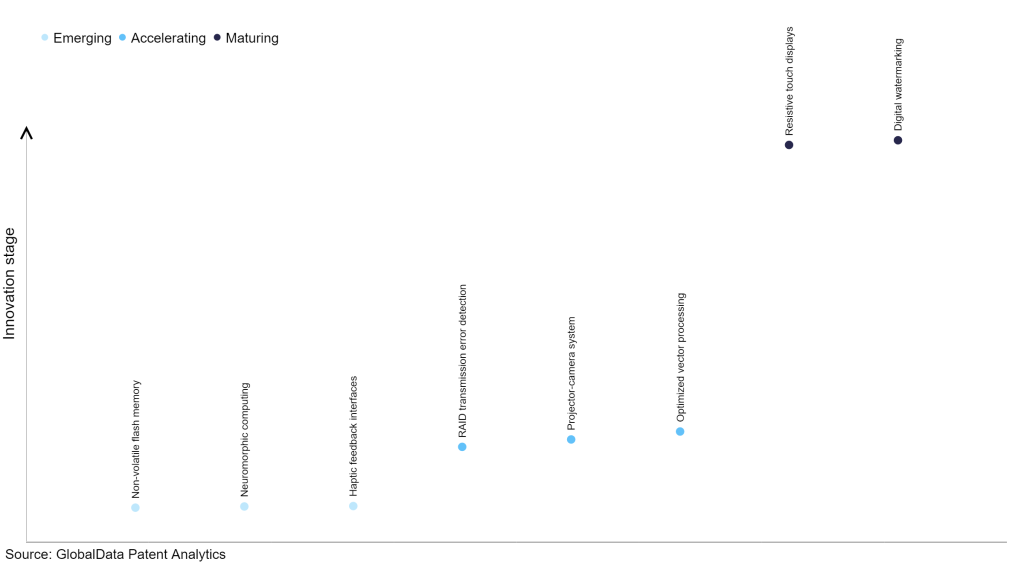The technology industry continues to be a hotbed of patent innovation. Activity is driven by the increasing demand for accurate and non-destructive analysis in industries such as agriculture, defense, and healthcare, the need for improved quality control and diagnostics, and the advancements in sensor technology and data processing capabilities. The growing importance specialized sensors that are capable of capturing a wide spectral range, sophisticated data analysis algorithms for image processing and spectral analysis, and data fusion techniques to integrate hyperspectral data with other imaging modalities as well as developments in compact and lightweight hyperspectral cameras and the integration of artificial intelligence (AI) and machine learning techniques, further support the innovation in technology industry. In the last three years alone, there have been over 1.5 million patents filed and granted in the technology industry, according to GlobalData’s report on Innovation in technology: hyperspectral imaging. Buy the report here.
However, not all innovations are equal and nor do they follow a constant upward trend. Instead, their evolution takes the form of an S-shaped curve that reflects their typical lifecycle from early emergence to accelerating adoption, before finally stabilizing and reaching maturity.
Identifying where a particular innovation is on this journey, especially those that are in the emerging and accelerating stages, is essential for understanding their current level of adoption and the likely future trajectory and impact they will have.
185+ innovations will shape the technology industry
According to GlobalData’s Technology Foresights, which plots the S-curve for the technology industry using innovation intensity models built on over 1.6 million patents, there are 185+ innovation areas that will shape the future of the industry.
Within the emerging innovation stage, non-volatile flash memory, neuromorphic computing, and haptic feedback interfaces are disruptive technologies that are in the early stages of application and should be tracked closely. RAID transmission error detection, projector-camera system, and optimized vector processing are some of the accelerating innovation areas, where adoption has been steadily increasing. Among maturing innovation areas are resistive touch displays and digital watermarking, which are now well established in the industry.
Innovation S-curve for the technology industry

Hyperspectral imaging is a key innovation area in technology
Hyperspectral imaging is an imaging technology that encompasses capturing and analyzing information across the entire electromagnetic spectrum. By utilizing multiple spectral bands, it generates images with high spatial and spectral resolution. This unique capability enables the extraction of more detailed information compared to conventional imaging techniques.
GlobalData’s analysis also uncovers the companies at the forefront of each innovation area and assesses the potential reach and impact of their patenting activity across different applications and geographies. According to GlobalData, there are 140+ companies, spanning technology vendors, established technology companies, and up-and-coming start-ups engaged in the development and application of hyperspectral imaging.
Key players in hyperspectral imaging – a disruptive innovation in the technology industry
‘Application diversity’ measures the number of applications identified for each patent. It broadly splits companies into either ‘niche’ or ‘diversified’ innovators.
‘Geographic reach’ refers to the number of countries each patent is registered in. It reflects the breadth of geographic application intended, ranging from ‘global’ to ‘local’.
Patent volumes related to hyperspectral imaging
Source: GlobalData Patent Analytics
Among the companies innovating in hyperspectral imaging, Sony Group is one of the leading patent filer. One of the company’s patents explains the methods and systems for obtaining image information of an organism and using it to calculate a growth index and anticipated harvest time. The image information includes visible and non-visible image data obtained from an image sensor, as well as a set of image data captured from at least two positions using multiple image capture devices.
Other prominent patent filers in the space include Olympus and HyperMed Imaging. HyperMed’s technology utilizes a proprietary form of hyperspectral imaging to assess oximetry in superficial tissue without the requirement of physical contact or injectable contrast. It uses visible light and a spectrometer to image and quantify light absorption in hemoglobin molecules and presents data as color-coded images.
By geographic reach, MBDA leads the pack, followed by Viavi Solutions and Spectral MD. In terms of application diversity, Samsung Group holds the top position, followed by HyperMed Imaging and Seiko Epson.
Hyperspectral imaging is an advanced technology that captures and analyses a wide range of electromagnetic wavelengths to obtain detailed spectral information of an object or scene. It enables precise identification and analysis of materials, improving applications in various fields such as agriculture, environmental monitoring, and remote sensing.
To further understand the key themes and technologies disrupting the technology industry, access GlobalData’s latest thematic research report on Technology.
Data Insights
From

The gold standard of business intelligence.
Blending expert knowledge with cutting-edge technology, GlobalData’s unrivalled proprietary data will enable you to decode what’s happening in your market. You can make better informed decisions and gain a future-proof advantage over your competitors.







